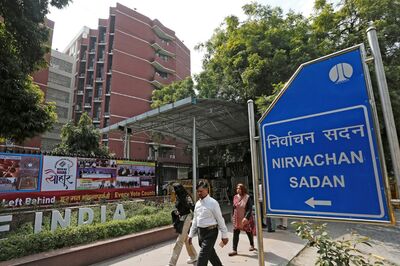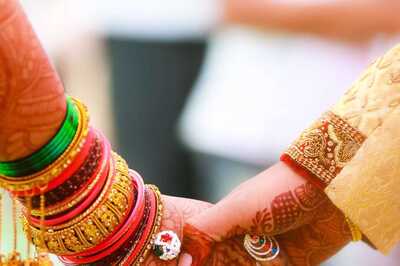
views
Alexandria: Egypt's first parliamentary elections since the fall of Hosni Mubarak brought the political debut of a potentially powerful new player on the scene, the ultraconservative Islamist movement known as the Salafis.
At several voting stations in this Mediterranean coastal city on Monday, Salafis packed the lines as early as 7 am, an hour before the polls opened, clearly distinguishable by the long, moustache-less beards of the men and the blanketing robes and veils of the women leaving nothing of their bodies visible but their eyes.
Their presence in the lines only grew throughout the day, as women in veils and gloves passed out campaign fliers for the Nour Party, the main Salafist entry in the race.
"Anybody who is afraid of the Salafis doesn't know who we are," said Um Ibrahim, 43, who wore a face veil and had dragged her children to the polls with her. "The Nour Party understands religion the way that God intended and they will lead us properly."
Islamic parties in general are expected to do well, likely to win a plurality or even a majority in the next parliament, raising the likelihood that Egypt will see an increased melding of religion into its politics. Strongest is the Muslim Brotherhood, Egypt's most organized political force, in existence for 80 years with a network of activists and charities nationwide.
After the lifting of Mubarak's autocratic hand, newly created Salafi parties have flooded onto the scene. They are challenging the Brotherhood's near monopoly on the religious bloc and are likely to push even harder than the Brotherhood for religious rule.
They bring an ideology that makes the Brotherhood look moderate in comparison. Salafis advocate a Saudi-style hard-line interpretation of Islam that brooks no compromise in a literalist interpretation of Shariah law and advocates a staunch segregation of the sexes. They have long shunned the concept of democracy, saying it allows man's law to override God's.
During the election campaign, their bluntness startled many in Egypt, where even the pious usually have a relatively easygoing view. During an Alexandria rally, Salafis covered a public statue with cloth because it included mermaids. One Salafi leader refused to appear on a TV political talk show until the female host put on a headscarf; another insisted a partition be put between him and a female host. A sheik recently burst into a concert at a Nile Delta university, took to the stage and shouted that music was "haram" - religiously forbidden.
But the Salafis also highlight why Islamists appeal to some. In a nation where poverty is widespread, Islamists - unlike liberals - have taken the lead in providing charity work and social programs, including free medical and educational services for the poor. While liberals fear imposition of Islamic law, some in this intrinsically religious society look on an Islamist candidate and see a moral person who is less likely to be corrupt.
"I am a divorced woman and the Nour party candidates have always helped me financially to stand on my feet," said Horreya Attia, a 52-year old mother of two. "The least I could do is return the favor at the polls."
In downtown Alexandria, Amira Salah, 19, sat with her friends talking about who to vote for. She was dressed in a way Salafis consider improper - makeup on her face, jeans and a colorful headscarf - but she surprised her girlfriends when she said she wanted to vote for the Nour Party.
"They'll be able to run the country in the right and God-fearing way," she said. "They will use the correct traditions of the prophet to rule Egypt. Even if they made me cover up from top to bottom and wear a face veil, I would be OK with it."
A major election question for Nour - Arabic for "light" - is whether it can cross over to Egyptians outside the Salafi fold. The movement has existed for decades but stayed out of politics and was a tiny minority. It grew in the past decade, as Salafi preachers in mosques and on satellite TV station pursued new flocks, particularly among the poor. Still, many Egyptians still see them as a Saudi import.
They have several strongholds around the country, particularly Alexandria, home to a main Salafi religious institute. Nour candidates are running for 22 of Alexandria's 24 parliament seats, and party leaders claim to have a realistic chance of winning 15.
Nour party candidate Yaser Abdel-Kawy said the clean political slate helps the Salafis.
"Those who have played politics with the previous regime have always been considered as soiled with the filth of the old regime," he told The Associated Press. "But the Salafis are ready to enter politics after almost 30 years of pure charity and social work, and without the bad reputation of politics - so people trust us more."
The 43-year old bearded father of five - who smelled slightly of musk, a scent some Muslims believe the Prophet Muhammad wore - is a psychologist by training but well known in the Raml district where he is running because of the social programs he directs. He was surrounded Monday by his entourage - four burly young men who compared biceps in the reflection of car windows when they thought no one was looking. Abdel-Kawy laughed, explaining they were there to protect him in case of violence at the polls.
He said the party does not intend to force its beliefs. Still, party spokesmen say the next constitution must strictly forbid any laws contradicting Shariah - implicitly meaning the strict Salafi view of Shariah.
Abdel-Kawi said Saudi Arabia's implementation of Shariah was not what he envisioned for Egypt, but also dismissed the model of Turkey. "They have gone too far with their freedoms," he said. "They put top value on secularism."
In past elections, the Brotherhood was the only option for Islamists.
Nevine Sameh said she used to vote Brotherhood. "But I have always been a Salafi and am more comfortable with the Nour party," the 21-year-old said after voting in the Alexandria slum of Suyouf.
Suyouf is the stronghold of Brotherhood candidate Subhi Saleh, who has carried it easily in past races. He was treated like a superstar during a tour Monday through the district as people lined up to shake his hand, thank him for help on personal issues and hold up their babies for him to kiss.
Saleh said that he couldn't believe he was experiencing what he called a truly free election - and acknowledged that meant there was now competition.
"This time the elections are truly political, and I have the burden of convincing people to vote for me."




















Comments
0 comment